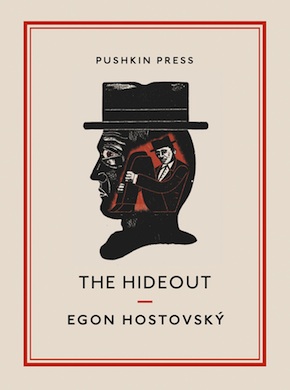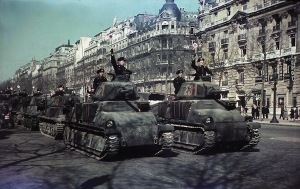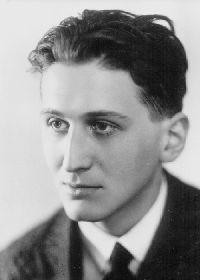The dream of a ridiculous man
by Mika Provata-Carlone
“Beautiful and intense.” Sunday Herald
This is a dark firecracker of a book – a deceptively slim volume dominated by a single, long-drawn voice that holds tremendous evocative powers and contains almost overwhelming quantities of undiluted pain but also startling wisdom. The storyline is almost risible – and the main character is convinced that the murkiest ridicule is his quintessential quality, the true measure of his irresistibly mitteleuropäisch life.
A renowned scientist in his country, he has invented what is perceived as the superweapon for the new world war that is about to break. His boss wants the plans; the Czechoslovak government wants his brain; the Germans will kill to get him and his notes; the French, well, the French don’t give a jot. As the Munich Agreement is being signed triumphantly by England, France, Italy and Germany, and as the fate of his country becomes all too terribly clear, he is seized with Gogol-like bravado and destroys every single iota of his research. It is the beginning of the end and of a new life. Several women who seem to be uncontrollably in love with him will risk honour and safety to warn him that his life is in peril. He will abandon his wife – the one woman he loves, as he discovers too late – his children, his entire existence, to follow the seductive and mysteriously sad, Jewish Mrs Olga to Paris.
The assignation is a disaster. From then on, he can neither go forward nor back. Trapped in the City of Light as it falls into darkness, he himself now needs to go into hiding: the Germans have him on their lists. The images of panic, of the mass exit, the betrayal and the fear, the sudden exposure of humanity at its most bare and vulnerable, are particularly intense. At the eleventh hour, a chance encounter results in a superbly Kafkaesque development: he will hide for the duration of the war in a dark cellar where his old friend and saviour, a Frenchman with a gothic sense of humour, used to keep his rats and conduct his unmentioned (unmentionable?) experiments. He is given to wear the clothes of Dr Aubin’s cousin, who, the story goes, had gone mad – an obviously fake ploy to save the man’s dignity, while also prefiguring much of what will follow.
This is a novel written as a love-letter that will be read too late – that is being written with the understanding that could have changed a life, perhaps a world, but never will.”
The doctor holds a sinister, terrifying fascination, like a Janus-face of good and evil. Convinced at first that the Germans are just ordinary chaps who happen to be enemies, he will eventually see them for what they are: “they aren’t fighting against people but against nature.” In and out of the narrative – we never have a concrete sense of who he is or what he does, he knows everything and everyone, and is also a philosopher with a sardonic sense of irony. As his guest grows tired of darkness, the seclusion of his damp living space, the loneliness and the endlessness of time, Dr Aubin prescribes the remedy of memory and reverie: “Remember things, live again some times gone by. And when you live yourself into them, look over the resurrected time carefully and wisely. Pretend you are Marcel Proust. You never read him? Shame on you! Neither did I.”
This is a novel written as a love-letter that will be read too late – that is being written with the understanding that could have changed a life, perhaps a world, but never will: “You must live to get this because you and I have to understand each other. And it is only now that I am ready to understand you… I have found so many words and thoughts I never knew of before… some deep feeling without a name.” The Hideout contains, in “the pallid distances of the past” that it resurrects to life, a sublime Rilke project of retrieving the treasure of childhood and of memory, while the stark, dark predicament of a single man will become a deadly metaphor for the tragedy and trial-by-horror of an entire race. Hostovský’s novel braces itself before a dehumanised history, before its omnipotence over consciousness and perception – how the angle of vision, of understanding, of the relationships of things and events changes in moments of historical explosions. “There is nothing worse than the fear of unimaginable people, things or events.”

German troops parade captured French tanks along the Champs-Elysées, 1941. German Federal Archive/Wikimedia Commons
The reality of The Hideout is the reality of distortion, like looking at the world of things, ideas, being itself, first straight in the eye, then at their multiple reflections in a series of convex and concave mirrors. Its anti-hero is an almost Dostoyevskian grin (the echoes of Notes from the Underground are unmistakable), an idiosyncratic wise fool trapped in a state of frenzied paralysis of thought and action, while endowed at the same time with almost prophetic clarity, wry humour and a taste for surreal climaxes of plot. At the same time, the incidental, gradual dehumanisation of this individual (non-Jewish) fugitive in his cellar-bound existence is an agonising allegory of that other systematic programme of dehumanisation and extermination. A righteous murder leads to a meeting with a sceptical resistance group, and to the decision to defy moral collapse, physical decay, his total erasure, no matter the price. It is an ultimate gesture of restitution of the value of existence to its rightful owner – an absent, silent, almost unreal humanity.
The Hideout is a torrential confessional entreaty for dialogue and recognition, where philosophy, empathy, the duality of all tragedy, the poetry of real suffering and life, the nakedness of the human soul, fuse into one. Embedded in the text are political commentary and historical criticism that are as sharp as splintered glass, as well as unflinching introspection and psychological pathology. The Hideout can be called a hybrid genre, tantalisingly knitting together the philosophical novel, the existential thriller, the spy romance and the noir war story, in a style of writing that is as cuttingly modern as it is anchored unashamedly on the Russian and German avant-garde of the turn of the century, on Prague as a metaphor of a particular psyche and literary culture. This is a narrative about human hope and the trauma of displacement, a story of stark Jewish themes, where Jewishness is seen as a question of memory, and nationhood as a matter of will and moral choice. The story of a people, of an individual, evolves into a more ecumenical question of exile, persecution, social and emotional isolation, alienation, identity and belonging, the problematics of violence, hatred, aggression. At its centre are the ethics of friendship and of the love between a man and a woman, in a kind of non-religious prayer, and in harmony with Joyce’s mantra that it is the imagination that is true memory.
The Hideout is a real find, a postern gate into a darkly marvellous other world of writing. It is not a new find, however, and Pushkin made a fine decision in reissuing the 1945 translation by Fern Long. It is a powerful, fluid, idiomatic translation, with a unique story of its own, that merits telling. Long was of Czech descent, though born American, and studied English at Radcliffe College, followed by a PhD in Philosophy at Charles University in Prague, where Hostovský had also studied. During the war, Long worked with the American Relief for Czechoslovakia and the Czech Educational Reconstruction department, translating and promoting Czech writers into English – among others, Rudolph Silva, Václav Rezác, and two of Hostovský’s novels, The Hideout and Seven Times the Leading Man. Her correspondence with Hostovský is with her papers at the Western Reserve Historical Society, and it would be fair to say that she introduced Czech literature as a national literature to Western readers for the first time – her involvement in Slavic cultural organisations lasted until the end of her life. Later, Philip Roth would follow, advocating for Milan Kundera, Ivan Klíma, Jiři Weil, Bohumi Hrabal, Váslav Havel or Karel Čapek. In Fern Long, Hostovský had not only a talented linguist, but also someone with a rare sense of the place, literary and real, its echoes and lilts, the darkness and tragedy of its people. Long’s translation is informed by a poignant sense of intimacy and complicity with the text, a rare convergence of two minds.
 Egon Hostovsky (1908–1973) was the youngest of eight children in a Jewish family in Czechoslovakia. When the Germans occupied the country, he fled across Europe and ended up in New York, where he worked at the exiled Czechoslovakian government’s consulate. One of the authors who shaped Czech literature during the inter-war period, he helped give form to the emergence of Central European literature represented by writers such as Franz Kafka, Joseph Roth and Stefan Zweig (he and Zweig were cousins). The Hideout is published by Pushkin Press. Read more.
Egon Hostovsky (1908–1973) was the youngest of eight children in a Jewish family in Czechoslovakia. When the Germans occupied the country, he fled across Europe and ended up in New York, where he worked at the exiled Czechoslovakian government’s consulate. One of the authors who shaped Czech literature during the inter-war period, he helped give form to the emergence of Central European literature represented by writers such as Franz Kafka, Joseph Roth and Stefan Zweig (he and Zweig were cousins). The Hideout is published by Pushkin Press. Read more.
Author portrait: Alchetron
Mika Provata-Carlone is an independent scholar, translator, editor and illustrator, and a contributing editor to Bookanista. She has a doctorate from Princeton University and lives and works in London.

